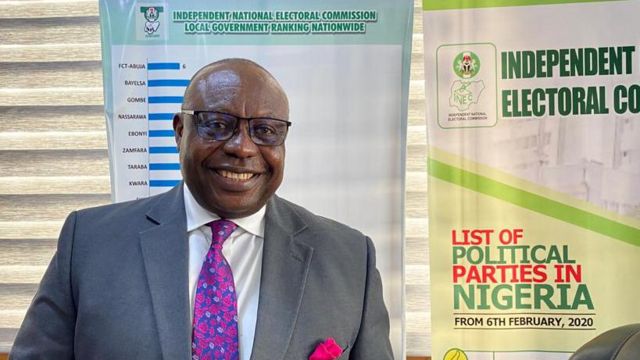Stephen Ukandu, Umuahia
The Independent National Electoral Commission, INEC, said over 200,000 Bimodal Voter Accreditation System (BVAS) machines would be deployed for use in the 2023 general election.
INEC National Commissioner and Chairman, Information and Voter Education Committee, Mr Festus Okoye, disclosed this Friday, while addressing newsmen in Umuahia, Abia State capital, when he came to monitor the Continuous Voter Registration (CVR).
He said that the BVAS would be deployed in the 176,000 polling units across the country, adding that the surplus will be kept handy as reserve.
According to him: “We will have one BVAS reserve in every Registration Area Centre (RAC) to ensure immediate intervention in case of any failure,” he said.
Okoye further said that Technical Officers would be on standby at every RAC to attend to any technical issues that could arise in the course of the polls.
He said that INEC had the capacity to conduct a credible general election in 2023, adding that the commission is poised to replicate the achievements and successes recorded in the Ekiti and Osun governorship polls.
He attributed the commission’s feat in the two elections to the deployment of technology.
He said that the deployment of technology and outcomes of the elections “have given Nigerians fresh hopes.”
He also said that 2023 offered the commission an opportunity to improve on its record.
“The Chairman of the commission, Prof. Mahmud Yakubu, has assured Nigerians that this commission is determined to conduct good elections to make sure that votes count.
“The commission will deploy technology to obviate human interferences to undermine its efforts,” Okoye said.
Okoye expressed delight over the large turnout of young Nigerians for the CVR.
He said that of the 11 million Nigerians that had completed their registration, about 7.8 million were between 18 years and 34 years.
“The interest shown by the young Nigerians meant that the future of the country is bright.
“The youths have shown that the PVC has power and they are ready to use it to make a change.
“The PVC has power and value. It is not enough to obtain your PVC. You must come out and vote on the day of the election,” he said.
Okoye further said that as at July 25, INEC’s record showed that about 28.5 million prospective voters registered online.
He said the figure included fresh registrants and those for transfers, or those who PVCs were destroyed, defaced and those who lost their PVC.
Meanwhile, Okoye has said that the July 31 deadline for the on-going CVR remains sacrosanct.
He explained that the commission had enormous task to accomplish ahead of the 2023 polls, and “cannot afford another extension.”
Okoye noted that the CVR had lasted for over a year and that INEC “will not glorify the last minute rush attitude” of some Nigerians.
He advised registrants not to engage in double or multiple registration as such amounts to criminal offenses that are punishable.
“At the end of the CVR, the commission will carry out a de-duplication to remove double and multiple registration,” Okoye said.
He warned that double and multiple registrations were criminal offences and amounted to exercise in futility.
“At the end of the CVR, the commission will carry out a de-duplication to remove double and multiple registration,” Okoye said.
He also spoke on the efforts by the commission to check “suppression of voters” through vote buying by desperate politicians and their agents.
Okoye warned against vote buying by desperate politicians, saying that the Commission is partnering relevant security agencies to checkmate the menace.
On the allegation of under-aged registration in some states, Okoye said INEC was yet to get any evidence of that, saying that appropriate sanctions will apply if established.
Okoye explained that PVCs had no expiry date and that it was not true that those obtained in 2011 needed to be re-validated.

